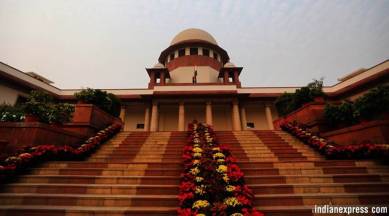Stay updated with the latest - Click here to follow us on Instagram
SC: Irretrievable breakdown of marriage amounting to cruelty, a ground for divorce
Allowing a plea by the husband, the trial court had dissolved the marriage on May 2, 2009. On appeal by the wife, the Delhi High Court set aside the trial court order on April 8, 2011, following which the man approached the Supreme Court.

Irretrievable breakdown of a marriage can be read as amounting to cruelty under the Hindu Marriage Act, 1955, and can be a ground for divorce, the Supreme Court has ruled.
Deciding a case in which a couple lived together only for four years and had been living separately for 25 years and had multiple litigations between them, a bench of Justices Sudhanshu Dhulia and J B Pardiwala said, “A marriage, which has broken down irretrievably, in our opinion, spells cruelty to both the parties, as in such a relationship each party is treating the other with cruelty. It is therefore a ground for dissolution of marriage under Section 13 (1) (ia) of the Act.”
Allowing a plea by the husband, the trial court had dissolved the marriage on May 2, 2009. On appeal by the wife, the Delhi High Court set aside the trial court order on April 8, 2011, following which the man approached the Supreme Court.
In its judgement Wednesday, the court said: “The husband and wife have been living separately for the last 25 years. There is no child out of the wedlock. There are bitter allegations of cruelty and desertion from both the sides and multiple litigations between the two in the last 25 years. This embittered relationship between the appellant and the respondent, which has not witnessed any moment of peace for the last 25 years, is a marital relationship only on paper. The fact is that this relationship has broken down irretrievably long back”.
“When we take into consideration the facts as they exist today, we are convinced that continuation of this marriage would mean continuation of cruelty, which each now inflicts on the other,” the court said.
It said that though “irretrievable breakdown of a marriage may not be a ground for dissolution of marriage, under the Hindu Marriage Act, but cruelty is”.
“A marriage can be dissolved by a decree of divorce, inter alia, on the ground when the other party has, after the solemnisation of the marriage, treated the petitioner with cruelty. In our considered opinion, a marital relationship, which has only become more bitter and acrimonious over the years, does nothing but inflicts cruelty on both the sides. To keep the façade of this broken marriage alive would be doing injustice to both the parties,” said the bench.
It pointed out that the High Court had taken the view that mere filing of criminal cases against the husband would not constitute cruelty. “All the same, the number of criminal cases filed by the wife against the husband are far too many… All these cases have either resulted in discharge or acquittal of the husband…”.
The ruling said that the apex court had in the past held that repeatedly filing of criminal cases by one party against the other in a matrimonial matter would amount to cruelty.
The bench said that “matrimonial cases before the courts pose a different challenge, quite unlike any other, as we are dealing with human relationships with its bundle of emotions, with all its faults and frailties. It is not possible in every case to pinpoint to an act of “cruelty” or blameworthy conduct of the spouse. The nature of relationship, the general behaviour of the parties towards each other, or long separation between the two are relevant factors, which a court must take into consideration”.
It pointed out that “cruelty has not been defined under the Act. All the same, the context where it has been used, which is as a ground for dissolution of a marriage would show that it has to be seen as a ‘human conduct’ and behaviour in a matrimonial relationship”.
About the case before it, the court said the long separation and absence of cohabitation and the complete breakdown of all meaningful bonds and the existing bitterness between the two, has to be read as cruelty under Section 13(1) (ia) of the 1955 Act. We therefore hold that in a given case, such as the one at hand, where the marital relationship has broken down irretrievably, where there is a long separation and absence of cohabitation (as in the present case for the last 25 years), with multiple court cases between the parties; then continuation of such a ‘marriage’ would only mean giving sanction to cruelty which each is inflicting on the other”.
The top court upheld the order of the trial court granting the husband the decree of divorce and set aside the order of the high court, saying “Their marriage shall stand dissolved”.
It directed the husband to pay Rs 30 lakh to his wife as permanent alimony in four weeks.